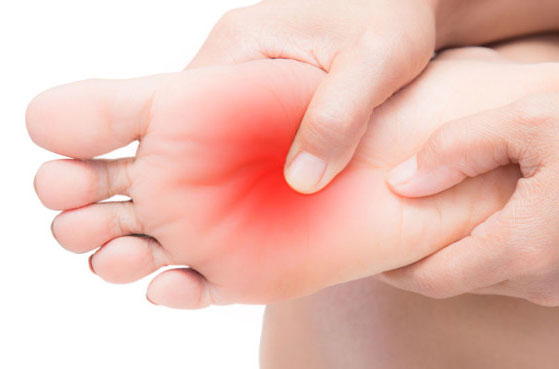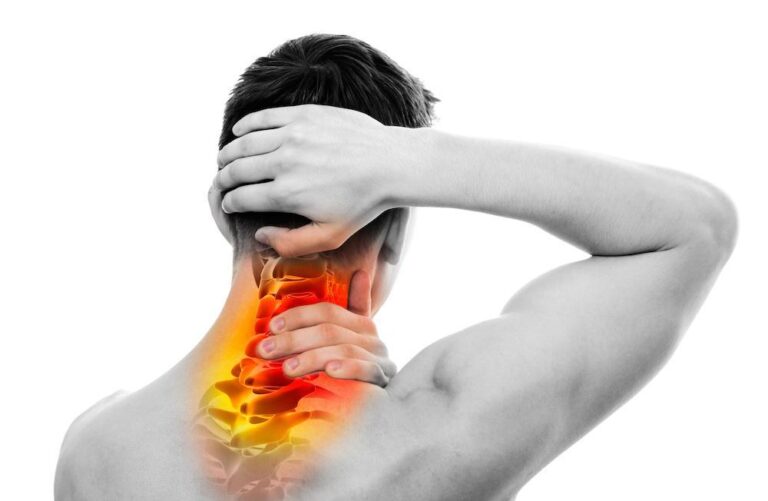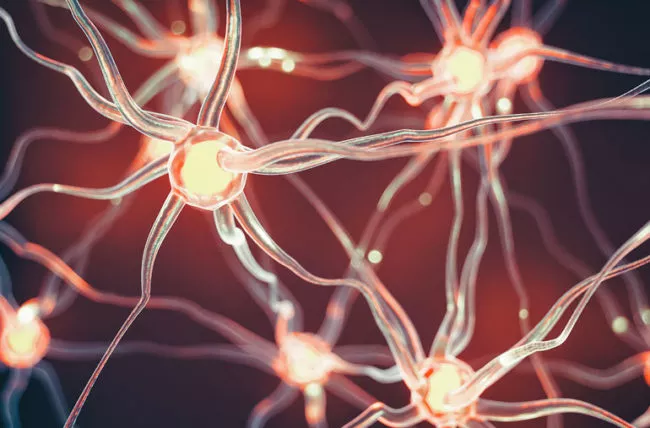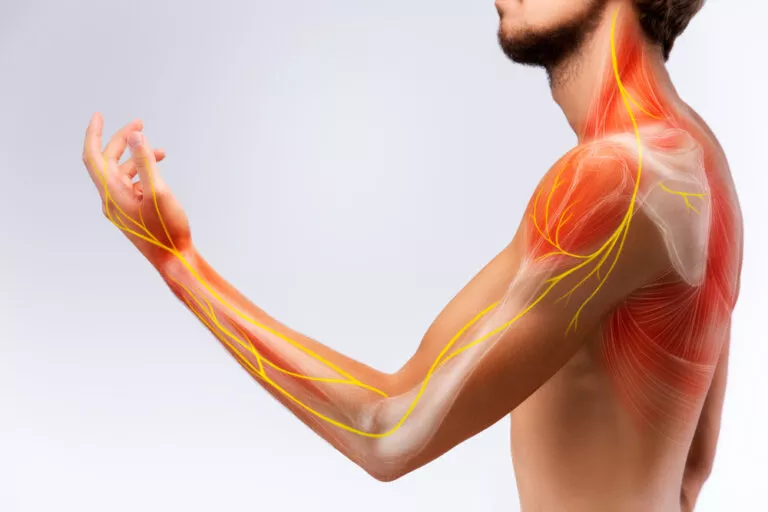NERVE PAIN
Nerve pain or neuralgia occurs in a particular nerve. Neuralgia can be a burning sensation, numbness, or pain spreading to more than one nerve. Any nerve can be affected by neuralgia. Read this article to know about the true meaning of neuralgia and its treatment.
 CAUSES OF NERVE PAIN
CAUSES OF NERVE PAIN
- Drugs
- Chemical irritants
- Chronic renal insufficiency
- Diabetes
- Infections, such as shingles, syphilis and Lyme disease
- Porphyria
- Nerve pressure from nearby organs (tumors or blood vessels)
- Nerve swelling or discomfort
- Nerve danger or serious problems (including surgery)
In most cases the cause is not known.
Nerve pain is a complex and chronic painful condition in which the pain persists even after the actual problem is gone. It may take a few days to a few months for nerve pain to start pain and the disease to be recognized. The pain can start even after minor damage to the nerve or after the old injury has healed.

WHAT ARE THE SYMPTOMS OF NERVE PAIN?
- Burning sensation
- Numbness
- Nerve pain
- The movement and functioning of the affected part of the body is blocked
- Muscle weakness
- Nerve damage
- The pain arises suddenly and there is a very sharp pain, as if some sharp object is pricking or There is a feeling of burning.
- Touching or pressing causes pain and even walking becomes painful.
- There is pain in the tract of the affected nerve or this pain is recurrent.
DIAGNOSIS OF NERVE PAIN
Nerve pain cannot be identified with a single test. Initially the doctor tries to diagnose the disease by physical examination along with a description of your symptoms and pain. Your physical examination may reveal –
- Abnormal sensation in the skin.
- Decreased deep tendon reflex or decreased muscle mass.
- Reduced sweating in the affected area (sweating is controlled by nerves).
- Touching pain or swelling near the nerve.
- Trigger points or areas where the pain starts even with the slightest touch.
- Dental examination, which excludes dental problems that can lead to facial pain (eg abscesses or abscesses in the teeth)
- Symptoms such as redness or swelling of the affected area, which may help diagnose infection, bone fractures, or rheumatoid arthritis.
NERVE PAIN TREATMENT
Nerve pain is generally difficult to treat, and often pain-relieving treatments do not make any difference to the pain. You need to try a variety of therapy methods to find out which one works best for you. Sometimes the condition improves on its own or over time. Since nerve pain is not easy to treat, the main goals of its treatment are –
- Reduce pain
- Helping you cope with chronic pain
- Reducing the effects of pain on your daily life
- If there is pain due to some internal disease (eg-diabetes, tumor), then if it is detected, then treatment of this disease is possible.
- In diabetic patients, tight control of sugar is beneficial in neuralgia.
- Sometimes there is pain due to pressure on the nerve due to a tumor or any other reason, in which case the reason causing the pressure needs to be removed with surgery.
- You may feel some symptoms like prickling, tingling when there is pain in the nerves. Apart from this, they may also feel a burning sensation throughout the day.

KNOW WHAT CAUSES NERVE PAIN
Nerve pain can bother people in many ways and during this time they can feel different types of problems. Some people experience a sharp pain in the nerves at midnight. You may feel some symptoms like prickling, tingling when there is pain in the nerves.
Apart from this, they may also feel a burning sensation throughout the day. If the nerve pain is very severe then it becomes difficult to tolerate it. But if it is treated in time, it is very easy to control. Let us know why nerve pain occurs and its causes.
UNDERSTAND NERVE PAIN LIKE THIS
Pain has always been considered a warning sign. When your hand gets too close to the gas, your nerves send painful signals to the brain and you pull yourself back before you burn out. But, if your nerves are weak or if they have any kind of damage, then this system is not doing its job. Damaged nerves can send the wrong signal and you feel real pain, often for no reason at all. You may not even feel pain when you are injured as a result of damaged nerves.
FACTORS THAT AGGRAVATE NERVE PAIN
Some studies have shown that certain body positions or movements such as standing in line or even walking can give you pain. Your body can also become very sensitive due to damage to the nerves. Some people may feel pain even with a sheet wrapped lightly on the body. You do not feel the feelings due to damage to the nerves
Nerve damage or pain can cause a loss of tingling sensation in the fingers or numbness in the fingers, which makes it difficult for you to do things with your hands.
You may find it difficult to knit, type, and even tie your shoelaces. People suffering from nerve weakness claim that their sense of touch becomes very weak and they feel like they are always wearing gloves.

NERVE PAIN AND SLEEP
Nerve pain is often very severe at night. Even the touch of a sheet can make you feel very upset and uncomfortable. If you are unable to sleep at night due to nerve pain then you need to see your doctor. Apart from this, you have to change your lifestyle habits and some medicines can help you in this.
WHAT PROBLEMS CAN I HAVE WITH NERVE PAIN?
Congestion of the nerves can cause mild or severe problems to a person. If a nerve pain is short-lived, there is usually no permanent damage to the nerve. Once the pressure is reduced, it is relieved and the nerves start functioning normally. However, if the pressure remains constant, the nerves can become permanently damaged along with severe pain.
DIAGNOSIS OF NERVE PAIN
To diagnose a pinched nerve, the doctor examines the body and also looks at the patient’s family history. Some tests are done to know this disease:
- X-rays – X-rays of bones are used to detect conditions such as abnormality, disc damage and narrowing of the bones.
- CT Scan– This detects the development of bone spurs in the cervical spine.
- MRI– MRI of the neck is done and the condition of soft tissue damage and pressure on the nerves is detected. Along with this, damage to the spinal cord and nerve root is also investigated.
- Electromyography – During an EMG, the doctor inserts electrodes through the skin into various muscles and checks for the contraction and expansion of the muscles by electrical activity.
In some patients, current is injected into the vein to detect compression of the vein and to rule out damage to the nerve or pressure on the soft tissues.
TREATMENT OF NERVE PAIN
There is no exact treatment for a pinched nerve. However, some therapies and medicines reduce the effect of a pinched nerve in a person. There are many types of medication for nerve pain :
- Non-steroidal anti-inflammatory drugs such as aspirin, ibuprofen, naproxen are used to reduce pain and other symptoms.
- Oral corticosteroids are given to relieve swelling and pain. Also narcotics are given to reduce severe pain.
- Steroids Injection helps in bringing down the inflammation as well as bring the nerves to their normal state.
- Even after continuous treatment, if the problem of nerve pain does not get better for several weeks or months, then doctors recommend surgery to reduce the pressure on the nerves. Bone spurs or herniated discs in the spine are removed by surgery.
If you or anyone you know is suffering from nerve pain, call us on (469) 545-9983 to book an appointment with our neurologists.
